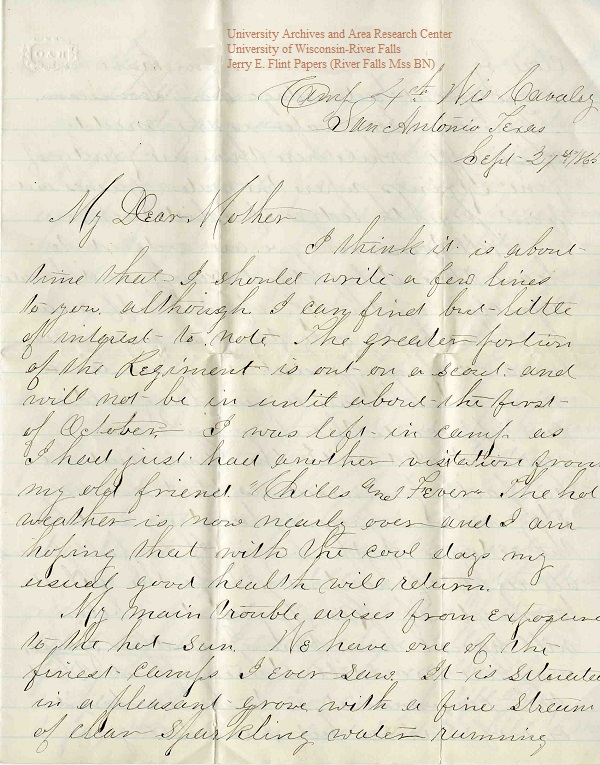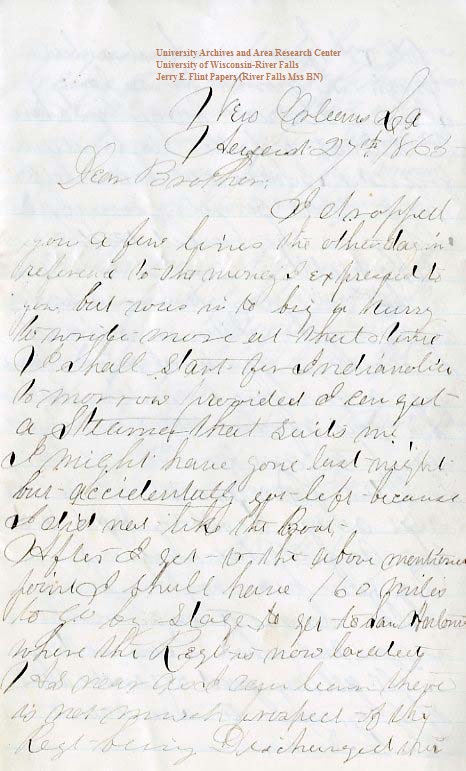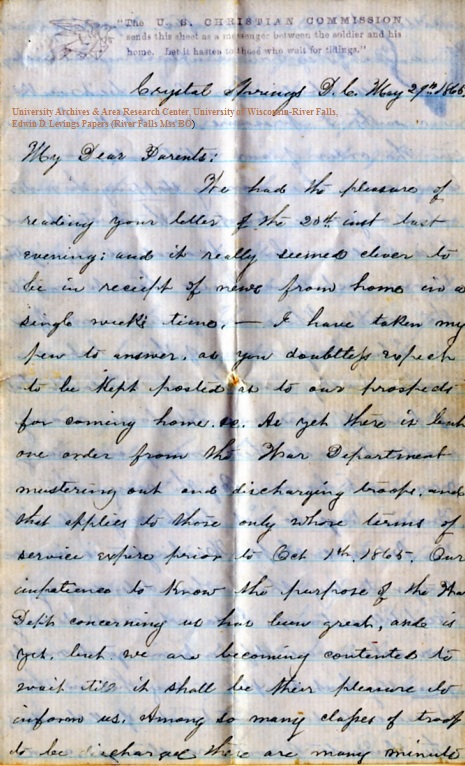The following letter is from The Prescott Journal of June 10, 1865.
Letter from Major Eden.
THINGS IN THE ARMY.
Tribute to Col. Sam Harriman.
Well thus we play the fool with the time ; and the spirits of the wise sit in the clouds and mock us —Second Part King Henry IV, Act II ; Scene 2.
SPEED.—And now you are metamorphosed with a mistress, that when I look on you, I can hardly think you my master.—Two Gentlemen of Verona, Act II ; Scene 1.
Love rules the Court, the Camp, the Grove.—Lay of the Last Minstrel.
FRIEND LUTE :—The multifarious wanderings of the 37th Badgers have at length come to a conditional termination in the wilds of Tenallytown. After perils by sea and land, compared with which Saint PAUL’s experience (vide¹ II Cor. chap. xi, verse 26,) was a mere holiday excursion, (without the additional modern peril of excursion trains,) we are permitted to rest on our laurels within sight of the City of magnificent distances. Our Division Hospital is located on our Mount Pisgah,² from the summit of which we can, like MOSES, behold the promised land, which again like him, we are not allowed to enter. Stern orders emanating from Hd. Qrs. Gen. Comdg. the Dist. keep us from the city, except in a very intermittent way.
But our otherwise hard lot, is much alleviated and relieved by the presence of sundry members of that portion of creation which adheres to the tenents [sic] of the crinoline persuasion—in the words of Mr. MICAWBER, “I allude to lovely woman.” Mrs. Col. SAMUEL and Mrs. Maj. BOSUEL of our Reg’t, honor us with their presence, as does also the wife of one of Col. Sam’s staff.
Therefore be it resolved :
I. That now the fighting is over, the Army is a big thing. II. That the presence of lovely woman in camp has a humanizing and moralizing influence. III. That it is worth getting into a row or two, if only for the sake of having l. w., as aforesaid, sympathise with you. IV. That under present conditions of pay, emoluments, and appurtenances, especially the latter, we are willing to suffer for our country for an indefinite period, unless sooner divorced.
The pleasingly domestic aspect of our Brigade Headquarters is truly refreshing. In the midst of the grim paraphernalia of war, various little feminine articles denote in so unmistakable manner the presence of l. w., as aforesaid. Our gallant Colonel mounts his charger with some mysterious article of infantile apparel clinging to his spur, or a doll’s head emerging from his pocket. Dress Parade has its solemn [–]nery relieved by a cheerful vision of mounted feminines, and the Colonel’s staff is augmented by almost an entire squadron of crinoline cavalry. “The spirit-stirring drum and the ear-piercing fife” have long ceased to charm, their martial tones having yielded to those of the peaceful piano. Crinoline ranks cartridges ; bayonets yield to bonnets ; picketing has become pic-nic-ing ; and camp and garrison equippment [sic] means horses and ambulances to convey the ladies to reviews.
A remodeling and reorganization of the army has long been talked of, and behold we have it, in a fashion never dreampt of by Casey [Silas Casey], little known to Hardee [William J. Hardee], and but dimly imagined by McClellan [George B. McClellan]. The Sanitary Commission has just sent for a supply of parasols, hoop skirts, and childrens’ [sic] carriages, and the Christian Commission for a large box of tracts for the young, for distribution through the Brigade, and for an exta suppl of preserved meats and fruits, to refresh the fainting bodies of its Chaplains, to enable the to discharge their new and onerous duties.
On the 9th inst. we had the pleasure of assisting as a spectator, at a very pleasing ceremony, the presentation to Col. Sam. Harriman of a very handsome sword and belt, by the officers of his staff.
The Inspector General, Capt. Chas. H. McCreery, was elected to do the talking, and spoke as follows:
COLONEL :—A pleasing duty has been given me to perform. During the time they have been associated with you, in the discharge of official military duties, the officers of your staff have learned to honor you for your high soldierly qualities—for the zeal and alacrity with which you have at all times performed the work assigned you, and for the kindness and gentlemanly treatment they have uniformly received at your hands. They will not soon forget the scene which they have passed with you, nor the conspicuous part you have taken in the closing days of the rebellion. Now that the war is over, we may soon be released from a soldier’s life and be permitted to return to our homes and kindred, and the more genial pursuits of civil life. They are unwilling this time shall come without expressing to you their appreciation of the important services you have rendered the government in its most trying hour, and their regard for you as an officer, a gentleman, and a friend. We may soon be separated. I express their feelings when I say, that their earnest wish is that your future in civil life may be brilliant as your past military career has been, and that a full measure of health, prosperity and happiness may be granted yourself and family.
Permit me, Colonel, in their behalf to present you with this sword—not on account of its intrinsic value, not as a slight token of their esteem and regard for you. Though they trust you may never have occassion [sic] to unsheath it in actual warfare, it may serve in the future as a memento of past associations that will ever be pleasant and sweet to them.
The Col. then responded, as follows :
CAPTAIN McCREERY AND OFFICERS OF THE STAFF.—I thank you for this beautiful token of your confidence and esteem.
It is doubly valuable coming as it does from those who have been most intimately connected with me during the time I have commanded the Brigade, and coming at the close of the campaign and the end of the rebellion, when there can be no selfish ends in view.
I trust and believe that it will never be necessary to draw this bright blade in defence of the nation but whether my path in life may be in civil or military pursuits, no act of mine shall tarnish this memento of your regard, but shall be kept bright and pure as I receive it from your hands.
The sight of it will bring back fresh to memory the many pleasant and many trying hours we have passed together, and around it will cluster many pleasing recollections.
It will be pleasant to remember it as a gift from officers who have been true gentlemen in their deportment, and always ready to sustain me in all I have attempted.
We shall soon be called upon to separate, perhaps never to meet again, but I shall ever remember you for your uniform kindness and the prompt and efficient manner in which you have discharged every duty while we have been associated together, and you will carry with you my prayers and wishes for your prosperity and happiness. Again, gentlemen, I thank you.
A few hours were then spent in friendly intercourse, while we were recipients of the kind hospitality of the Colonel and his amiable and agreeable lady.
We have since then had a series of visits from Gov. Lewis [James T. Lewis], Gen. Lucius Fairchild, Gen. Gaylord [Augustus Gaylord], Gov. Crasse, of Michigan and have reviewed and paraded to our hearts’ content.
Adieu, Lute ; we hope the day is not far distant that will see us on our way home to the State, when we, that is us, intend visiting Prescott, and investigating the habits and customs of the Ed. Fam. Pap. .R. C. E. [Robert C. Eden]
1. Vide is used to direct a reader to another item; in this case a book in the New Testament of the Bible, Second Corinthians, chapter 11, verse 26, in which the Apostle Paul writes, “I have been constantly on the move. I have been in danger from rivers, in danger from bandits, in danger from my fellow Jews, in danger from Gentiles; in danger in the city, in danger in the country, in danger at sea; and in danger from false believers.” 2. Another Biblical reference, this time to the Old Testament book of Deuteronomy (chapter 34, verses 1-4), where God commanded Moses to climb up and view the Promised Land.







